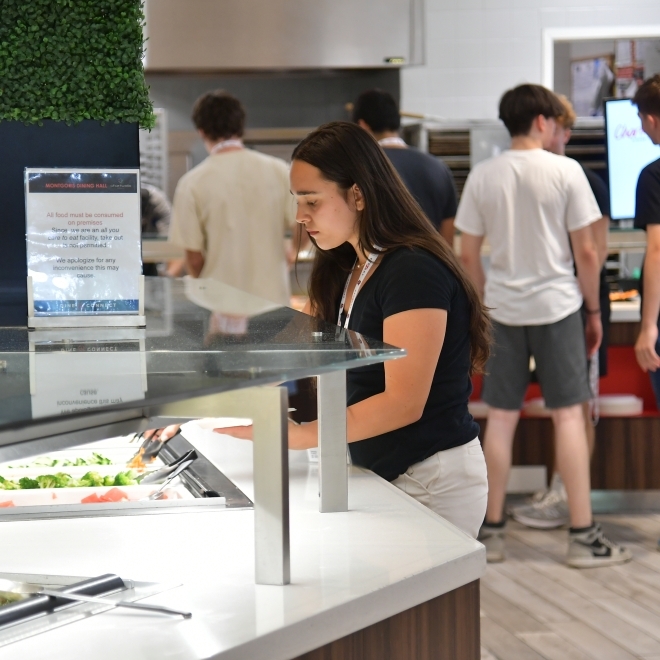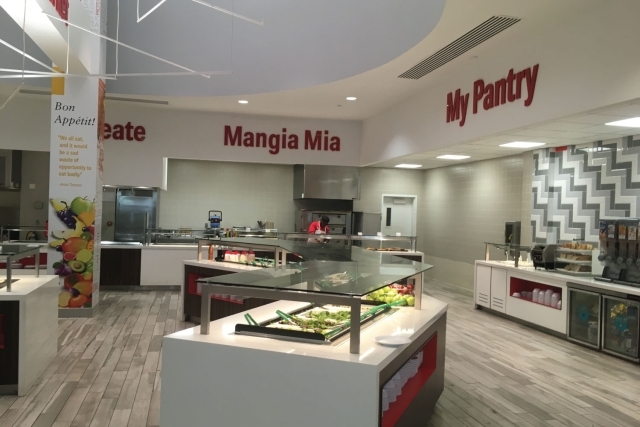Allergy-Safe College Dining: Life-Changing Tips from a Registered Dietitian

Navigating the dining halls on a college campus can be intimidating for new students, especially those with food allergies. With so many food options available, it can be challenging to know what is “safe” to eat. The number of students with severe food allergies is steadily rising, and many college campuses are doing more than ever to ensure that food-allergic students feel comfortable when choosing meals and snacks.
As the St. John’s campus dietitian, I work closely with food service staff and food-allergic individuals daily to ensure that allergen-friendly options are available and that proper food handling protocols are followed when preparing meals for students with food allergies.
In this blog post, you learn about
- Essential tips and strategies for navigating campus dining with food allergies
- Meal planning
- Communicating with dining staff
- Accessing university-specific resources for safe dining
I. Understanding Food Allergies in College Dining Halls
Get to Know the ‘Big 9’ Food Allergens.
A wide range of foods can trigger food allergies. The Food Allergen Labeling and Consumer Protection Actof 2004 (FALCPA) identified eight common food allergies as milk, eggs, fish, shellfish, tree nuts, peanuts, wheat, and soybeans. On April 23, 2021, the Food Allergy Safety, Treatment, Education, and Research (FASTER) Act added sesame to this list, effective January 1, 2023. These allergens are known as the “Big 9,” and food manufacturers must identify them on product labels.
How Food Allergies Impact College Life: Social and Physical Challenges
An allergic reaction can trigger various symptoms, including hives, facial swelling, abdominal cramps, or difficulty breathing. Reactions can vary from mild to life-threatening, with the most severe leading to anaphylaxis. It is crucial to recognize the signs of an allergic reaction and seek medical help immediately. Beyond the physical symptoms, food allergies can also impact students socially. Social isolation, anxiety about eating in groups, and fear of cross-contact in dining settings are common concerns. In this post, we explore strategies to help mitigate these challenges.
What is anaphylaxis?
Anaphylaxis is a severe allergic reaction that can result in difficulty breathing, swelling of the throat, and a drastic drop in blood pressure. Stop consuming the suspected allergen immediately if anaphylaxis occurs and seek emergency medical attention.
II. Life-Changing Tips for Managing Food Allergies in Campus Dining Halls
Do Your Research.
Research is vital when navigating food allergies. At St. John’s University, the Dine on Campus website features “U icons,” which identify menu items that meet specific dietary needs.
Learning to look for food allergens on food labels can also help identify possible allergen sources. For example, if an item is listed by anything other than the common name, FALCPA requires that these allergens be listed in parentheses, i.e., “lecithin (soy).” Also, it may be listed after or next to the ingredient list in a “contains” statement.
Don’t Be Afraid to Ask Questions.
Don’t hesitate to ask the dining staff for clarification on menu items. At St. John’s, associates are trained to assist with food allergy needs. If you’re concerned about cross-contact, request an “allergy kit,” which includes clean tools and utensils dedicated to preparing allergen-free meals.
Plan Meals in Advance.
Be proactive about your meal planning! While planning your meals can seem like a burden, it can significantly reduce your risk of accidentally consuming an allergen. Before heading to the dining hall, review the Dine on Campus menu for food options, nutrition facts, and allergen information.
Pack Emergency Snacks.
Bringing pre-packaged, allergen-friendly snacks can be a lifesaver. Check out the snacks available at the markets in Montgoris Dining Hall and Marillac Hall for convenient options.
Read my other blog post, “Affordable, Healthy Snacks for College Students,” for information on snacking, including budgeting, nutrition, and snack ideas.
Market Hours of Operation
- seven days a week near Montgoris Dining Hall from noon to 10 p.m.
- Monday–Friday in the Marillac Food Court from 11 a.m. to 7 p.m.
III. Creating a Safe Dining Experience: Tips to Stay Safe and Informed
Know the Signs of Cross-Contact.
Cross-contact occurs when an allergen or allergen-containing food comes into contact with an allergen-free food. It can result in the unintentional consumption of food allergens, so it is essential to be aware of the risks. This type of exposure can be hard to avoid as there are often no visible signs that cross-contact has occurred.
Some areas prone to cross-contact that you should be wary of include
- food storage method
- fryers
- ovens
- salad bars
- self-serve buffets
- shared equipment
- stoves
- toasters
- utensils
Some ways to reduce the risk of cross-contact incidents include using separate cooking tools and equipment, thoroughly cleaning surfaces before preparation, storing foods separately from allergen-containing foods, and educating friends and family on the importance of cross-contact.
Utilize Campus Resources.
The St. John’s Dining team does an excellent job of creating a safe dining experience for all students. First and foremost, all students have free and unlimited access to me, the campus dietitian, to discuss their food allergies in-depth and create a specific plan for them.
St. John’s offers an allergen-friendly station in Montgoris Dining Hall called Delicious Without. All menu items are made without the use of the top nine major allergens. The menu rotates daily for lunch and dinner and offers various flavors and textures. At all other dining locations, food-allergic individuals can ask food service associates to modify their meals, and staff will always be happy to accommodate them.
IV. How to Advocate for Yourself
Build Relationships with Dining Hall Staff.
Building relationships with our associates can be a great way to avoid miscommunication or unintentional errors. As we say, “Don’t be shy, self-identify!”
Introduce yourself to the food service staff and make your allergies known. You should always advocate for yourself so that associates are aware of your allergies, and you should never expect them to learn about your specific allergies without saying something.
Stay Informed about Your Allergies.
Knowledge is power, and arming yourself with the latest information regarding your allergy is vital for your safety. Learning about allergies can be as simple as using free electronic resources (e.g., US Food & Drug Administration articles), contacting your physician, or contacting your friendly campus Registered Dietitian.
V. The Role of a Campus Dietitian: Support for Students with Food Allergies
As your campus dietitian, I am always available to answer any nutrition-related questions and concerns regarding special dietary needs and/or specific food allergy questions and advice. I provide many services, including one-on-one counseling. To make a free appointment, email me at [email protected].
A Safe and Enjoyable Dining Experience at St. John’s
Although eating on campus as a student with food allergies can be overwhelming, St. John’s Dining offers many valuable resources to help everyone eat well and safely. By knowing your options, asking for help, and utilizing campus resources, you can enjoy a safe and healthy dining experience! Follow the @StJohnsdining Instagram for fun and informative content on campus dining.









